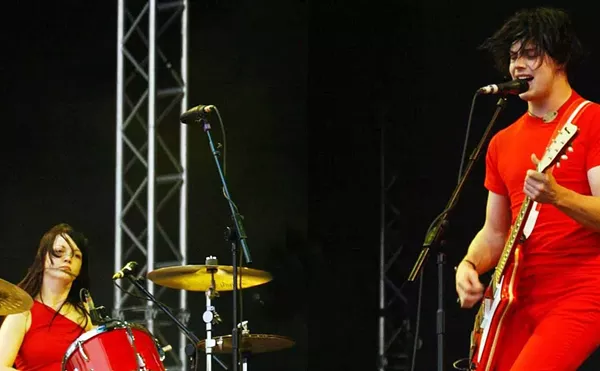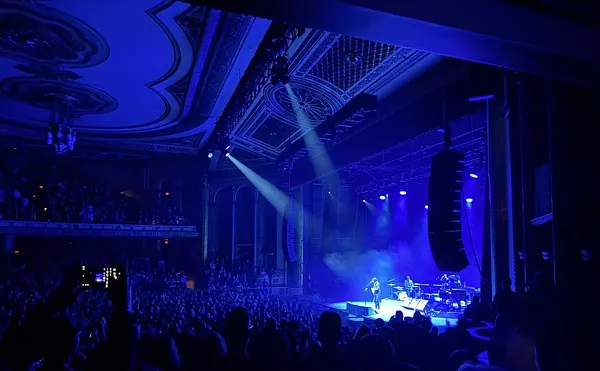
Audio By Carbonatix
[
{
"name": "GPT - Leaderboard - Inline - Content",
"component": "35519556",
"insertPoint": "5th",
"startingPoint": "3",
"requiredCountToDisplay": "3",
"maxInsertions": 100,
"adList": [
{
"adPreset": "LeaderboardInline"
}
]
}
]
Bill Kirchen's life changed dramatically that day in late-'60s San Francisco when he traded his Gibson SG for a Fender Telecaster.
Kirchen's unsure of the guitar's exact age, though he knows it was made in the late '50s. Over the 40 years he's had it, it's seen some road wear — most of the finish has worn off, and only the neck, body, and the little metal ferrules that the strings pass through are original.
"All the wear on it, I put on it myself," he says.
That guitar and its king-hell twang took Kirchen's band, Commander Cody and His Lost Planet Airmen, to the Top 10 of the Billboard singles chart with a cover of George Wilson's "Hot Rod Lincoln" in 1972. He's played it alongside the likes of Elvis Costello, Nick Lowe, Emmylou Harris, Gene Vincent and countless others. That same alchemical machine of wood and wire has also been the engine driving his seven solo albums, including 2001's Grammy-nominated Tied to the Wheel; night after night, it's in his hands as he grinds out his dieselbilly ruckus in clubs across the country.
Kirchen pays tribute to the Telecaster on Hammer of the Honky-Tonk Gods, his newest album. He says the guitar is an example of a perfect design — "born at the junction of form and function," as the record's title track says. He also notes that both he and the Telecaster are nearly the same age — Kirchen was born in 1948, while Fender first sold the Tele model (as the Broadcaster) in 1950.
It wasn't the Telecaster, though, that first led the Ann Arbor native to a life of music. Kirchen was something of a child prodigy on the trombone, and it was when he was perfecting those chops at northern Michigan's Interlochen in the early '60s that he discovered folk music. It was the height of the "Great Folk Scare," and Kirchen's introduction came courtesy of a 12-string guitar-playing folknik named Dave Siglin (the legendary and soon-to-retire program director at the Ark in Ann Arbor). Artists such as Pete Seeger and Mississippi John Hurt soon captivated Kirchen, and from there it was a short slide into the world of psychedelic rock. Kirchen's band, the Seventh Seal, was infamously on stage when TransLove Energies and John Sinclair watched their Belle Isle Love-In turn into an ugly melee of hippies, bikers and cops in April 1967.
Later that same year, Kirchen became a founding member of Tree Town's groundbreaking stoner country outfit Commander Cody and His Lost Planet Airmen. He moved to San Francisco in 1968, the rest of the band joining him a year later, and they began an impressive run that included "Hot Rod Lincoln" (off the rough-skinned 1971 classic Lost in the Ozone) and 1974's Live from Deep in the Heart of Texas, one of the greatest live albums this side of Kick Out the Jams or even Kiss's Alive II.
Post-Cody, Kirchen recorded three albums with a swing orchestra called the Moonlighters, the second of which was produced by Nick Lowe. He's also worked as a high-profile hired gun in addition to his work as a solo artist.
Modern Maturity
Kirchen can deliver a novelty song like a champ. For proof, just listen to "Truck Stop at the End of the World" from Tied to the Wheel. But he used Hammer of the Honky-Tonk Gods to showcase a more mature side to his songwriting.
"I decided to write some songs that were a little closer to the bone," Kirchen says. "I decided to let go of the whole truck-driving conceit for a while."
The album's 11 songs tend to be about real people grappling with real-life situations — divorce, professional ennui, existential angst, political frustration. Kirchen wrote six of the songs with assorted collaborators, including his wife, Louise, and Sarah Brown, a fellow Ann Arbor native and house bassist at Austin, Texas, hotspot Antone's.
"I was trying to write songs that are more meaningful to me, and maybe try to say a little more," Kirchen says. "For instance, I didn't set out to intentionally write anything that would be automatically considered a novelty song, which I certainly have in the past."
Despite the occasionally dark-tinged subject matter, Kirchen says he's not particularly reflective these days.
"It's not like I'm all of the sudden dying or something," he says. "It's a wild time in the world. Maybe that's somehow influencing me. It's a stressful point in history, and that can't help but be reflected in what I write."
One of the album's standout tracks, "Rocks into Sand," began as an angry screed inspired by an attempt in Dover, Pa., to teach the creationism-based Intelligent Design as science in public schools. But by the time he recorded it, it had evolved into a midtempo existential rumination.
"That started as a table-thumper, and it turned into a more reflective piece," Kirchen says. "It was going to be an old man's rant, and at some point it turned into a meditation, you might say."
The band on Hammer of the Honky-Tonk Gods reunites Kirchen with Lowe and other members of the Impossible Birds, Lowe's mid-'90s backing band. And Kirchen acknowledges that knowing he would be recording with Lowe — one of his favorite songwriters of all time — spurred him on.
"All I can say really is that I tried a little harder this time. I spent a lot more time on it," Kirchen says. "I did not want to show up there with nothing but cover tunes and something I dashed off. That influenced me, certainly."
But he points to one of the album's cuts, the sprightly and devil-may-care "One More Day." With a joie de vivre that can only come from the wisdom of age, it's sure to resonate with the tie-dyed AARP set. Kirchen says that song "describes accurately my love of life," adding: "I'm still having a great time. I don't mean this to be a heavy-handed record. This isn't a doom-and-gloom record."
When he's not playing gigs, Kirchen splits his time between abodes in Washington, D.C., and Austin. He'll be hitting the road in support of Hammer of the Honky-Tonk Gods in February. Kirchen doesn't yet have any Michigan dates scheduled, but hopes that will change in the next few months.
For updated tour info, go to www.billkirchen.com.
Brian J. Bowe is a freelance writer. Send comments to letters@metrotimes.com.




